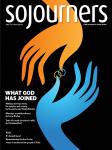THE SAGA OF Elijah that we are following in 1 and 2 Kings culminates in a poignant parting as the prophet prepares to be taken up into heaven. His disciple, Elisha, makes a final all-or-nothing request: “Please let me inherit a double share of your spirit” (2 Kings 2:9). Elijah states a condition for the fulfillment of Elisha’s prayer: “You have asked a hard thing; yet, if you see me as I am being taken from you, it will be granted you; if not, it will not” (2:10). It is as if Elisha has to look unblinkingly into the reality of their separation. If he is to inherit the prophetic mantle and spirit of his teacher, he must claim the vocation in its entirety. He is now to be the prophet.
The story is an uncanny pointer to the truth that John the Evangelist highlights in Jesus’ last words to his disciples: “I tell you the truth: It is to your advantage that I go away, for if I do not go away, the Advocate will not come to you ...” (16:7). John even echoes the “double spirit” theme in 14:12, when he has Jesus assure us that our prophetic endeavors will be more abundant and powerful than Jesus’ own!
The season following Pentecost helps us realize that we are the prophets now, vested with the mandate and endowed with the gifts for enacting the good news of liberation.
[ JUNE 2 ]
A Climate of Relativism
1 Kings 18:20-39; Psalm 96; Galatians 1:1-12; Luke 7:1-10
DOES AMERICA DESERVE its reputation as one of the most religious countries in the world? As I prepared to migrate here in 1979, I was jolted by the provocative words of Henry Fairlie, a feisty British journalist who had settled in the States a few years before. “The proliferation of contemporary cults in the United States, like the proliferation of sects in the past, is a reminder that the United States is an irreligious country,” wrote Fairlie. “Only a people who do not take God seriously could permit [God] to be sought and worshipped and proclaimed by any person who took it in his [or her] head to do so; for any reason, in any manner, to any purpose, for any satisfaction.”
Well, America is certainly a place where religious pluralism has reached its apogee. This climate of relativism—of “anything goes”—makes Paul’s stance, typified in this week’s reading from Galatians, all the more challenging. He speaks of the seductions of “a different gospel” (verse 6) and of those who want to “pervert the gospel of Christ” (verse 7). The stakes are high (verse 8): “But even if we or an angel from heaven should proclaim to you a gospel contrary to what we proclaimed to you, let that one be accursed!”
And behind this passion for separating the authentic Christian message from the adulterated is the story of Elijah’s lonely witness to the God of his ancestors on Mount Carmel. Here the prophet calls to account the syncretism that would blend the faith of Israel with the fertility cults of Canaan, which had royal backing and popular consensus. God’s good news is for the whole of humanity, but it is vulnerable to mutation and perversion. We carry a terrible responsibility in our discernment.
[ JUNE 9 ]
‘I Say to You, Rise!’
1 Kings 17:8-24; Psalm 30; Galatians 1:11-24; Luke 7:11-17
THE SOUVENIR MOST kids brought back from English seaside resorts was a “stick of rock”—a long cylinder of fluorescent pink candy with a white interior. The confectioners skillfully incorporated the resort’s name within the toffee. The advertisements assured us it was “lettered all through.” However one sliced the candy, it still displayed the name. This week’s scriptures perfectly illustrate the way the Bible is also “lettered all through” with the good news of the resurrection, no matter how you slice it.
In Luke, Jesus summons back to life the dead son of the woman from Nain. In 1 Kings, Elijah breathes life back into the dead son of the widow of Zarephath. In both stories, the prophets give the newly alive boys back to their mothers. Behind each vignette—and the accompanying psalm that laments at the brink of the grave—is the scene of universal human agony at bereavement. Michelangelo’s “Pieta”—Mary cradling her child’s corpse—captures the apparently effortless power of death to separate us, to annihilate us.
But the soundless voice of God over the tomb of Jesus changes all that: “Young man, I say to you, rise!” Then we are the joyful mother who receives back our Son, victorious over death, now risen. This is the word that Paul did not need to receive “from a human source” (Galatians 1:12), since it was not a teaching of human origin. It was revealed directly to him in his encounter with the risen Lord on the Damascus road. Why? “God was pleased to reveal his Son to me, that I might proclaim him among the Gentiles,” Paul recounts (1:15-16).
[ JUNE 16 ]
What Should We Die For?
1 Kings 21:1-21; Psalm 32; Galatians 2:15-21; Luke 7:36 - 8:3
THERE IS SOMETHING intolerably cheap about the popular expression “to die for.” What if we were really to choose what is worth giving up our life for? This week’s scriptures explore what dying for something means. The lurid tale of Naboth’s vineyard presents Ahab just dying to get his hands on his neighbor’s land. It just killed him to be frustrated, so “he lay down on his bed, turned away his face, and would not eat” (1 King 21:4). Jezebel’s remedy? She had Naboth framed and killed. The wheel of violence, though, will roll over the perpetrators. Covetousness is deadly, and a violent and degrading end lies in wait for them.
Paul proclaims to the Galatians what is worth dying for—a totally fresh identity found through union with Christ. “I have been crucified with Christ; and it is no longer I who live, but it is Christ who lives in me. And the life I now live in the flesh I live by faith in the Son of God, who loved me and gave himself for me” (verses 19-20).
The woman who anoints Jesus’ feet in the Pharisee’s house has undergone a death. Instead of dying of shame, she has died to shame. With breathtaking insouciance she crashes the party. In a sensuous gesture of devotion, she expresses her gratitude to Jesus for his message of God’s amnesty. Jesus’ freedom has drawn her. He is perfectly free of shame. He relishes her caresses with a tenderness that is totally careless of reputation.
[ JUNE 23 ]
Silence and Sanity
1 Kings 19:1-15; Psalm 22:19-28; Galatians 3:23-29; Luke 8:26-39
THE CANAANITE PSALMS, recovered by archaeologists, reveal that Israel’s pagan neighbors identified violent storms and earthquakes as pyrotechnic proof of the power of their native gods. Israel’s priests were impressionable enough to plagiarize some song sheets from the choir directors at the shrines of Baal. In the story of Elijah’s retreat in the cave on Mount Horeb (1 Kings 19:11-15), the prophet reveals his keen awareness of the difference between the Lord of the covenant and the storm gods of the nations. The Lord is not in the wind, the earthquake, or the fire. Sheer silence forces the prophet to listen to the inner summons to the arduous task of raising up leaders in Israel, regardless of the vulnerability of being utterly in the minority.
In Luke’s gospel about the healing of the lunatic named Legion, Jesus heeds the summons to divine warfare against all the invasive and contaminating forces that pit themselves against human well-being, that aggravate powerlessness, isolation, and division. Healing the demented man (whose possession so uncannily mirrors the plight of those living under Roman occupation), Jesus sends him to calmly demonstrate the sanity that God bestows. Clothed and in his right mind, he is to return home and invite people to the life of gratitude and joy sheltered by the compassion of God.
[ JUNE 30 ]
All Energies Toward Freedom
2 Kings 2:1-2, 6-14; Psalm 16; Galatians 5:1, 13-25; Luke 9:51-62
PAUL SPEAKS TO the Galatians of crucifying “the flesh with its passions and desires” (5:24). We seldom echo him, mostly because his language is so likely to be misheard as an ascetic’s dreadful command to repress our erotic natures. In today’s Galatians reading, can we hear Paul’s warning that we can’t drift out of the stultified human condition? “The flesh” (sarx, in Greek) is not a state of human freedom from constraint, but the opposite. It is being trapped within the cycle of violence and estrangement and addiction, desire perverted by a collective death wish. To break out of this trap, we must put all of our energies into the longing for freedom—freedom within which we can realize our potential for “love, joy, peace, patience, kindness, generosity, faithfulness, gentleness, and self-control” (5:22-23).
The robustness of Paul’s language is matched in Luke’s gospel by the shocking challenge Jesus puts to a would-be follower who wants to defer joining him until after his father’s funeral. “Let the dead bury their own dead,” retorts Jesus. What is this reign of God that takes precedence over a duty as unquestionable as that? What is the “deadness” Jesus summons us to leave behind? James and John, the “sons of thunder,” have just given us a glimpse of that deadness by asking Jesus’ permission to call down a vengeful fire upon the Samaritan village that has turned them away. Jesus has to rebuke them. That is not the way to life.
“Preaching the Word,” Sojourners’ online resource for sermon preparation and Bible study, is available at sojo.net/ptw.

Got something to say about what you're reading? We value your feedback!
